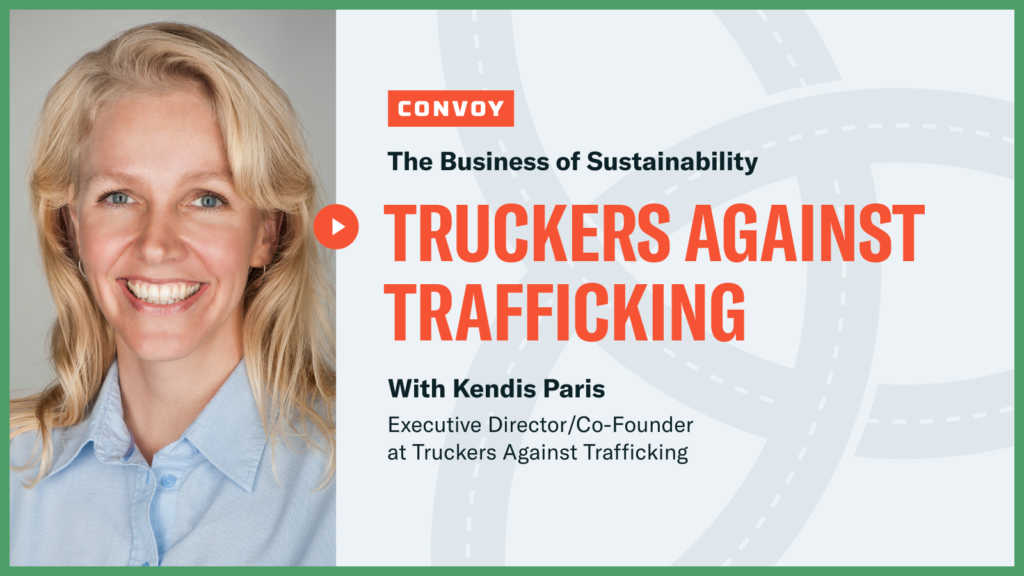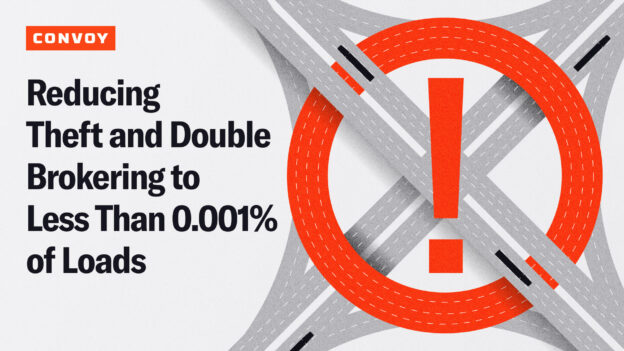Truck Drivers To The Rescue: Equipping Truck Drivers To Report Trafficking
Shippers, Sustainability • Published on August 17, 2020
Human trafficking — where people are bought and sold for forced labor or commercial sex — happens in every state across America with the number of victims estimated to be in the hundreds of thousands. One of the most frequent locations where the FBI were finding women and children being coerced into prostitution was at truck stops and places along our nation’s highways where truck drivers frequent.
To learn more about this situation, we wanted to hear from Kendis Paris, Executive Director/Co-Founder at Truckers Against Trafficking (TAT). TAT began a mission in 2009 dedicated to raising up the largest mobile army of transportation professionals to discover and disrupt trafficking networks where individuals are being tortured, sexually assaulted, and pimped out against their will.

We spoke to Kendis about human trafficking and asked the following questions:
- Why did you start Truckers Against Trafficking?
- What is the greatest challenge you have overcome in reaching your mission?
- What has been your greatest impact so far?
- Has COVID-19 impacted trafficking or your organization?
- What is the best way to learn about Truckers Against Trafficking?
Kendis provided amazing insight into this form of modern day slavery — including how it has been impacted by COVID-19 when a significant number of people became cut off from their social groups or were forced into more vulnerable situations. Through the TAT truck driver awareness programs — which CONVOY has made available to its network of drivers — Kendis shares how truck drivers and those whose jobs it is to be in truck stops and along America’s highways can actually make a difference in this horrific situation.
Watch the video or read the transcription below.
TRANSCRIPTION
Jennifer Wong: Hi everyone. Thanks for joining this series. My name is Jennifer. I lead sustainability at Convoy. In this series you’ll hear directly from pretty incredible people on how they’ve transformed corporate cultures and position their companies as sustainability leaders. Today we have Kendis Paris joining us. She is the Executive Director and Co-Founder of Truckers Against Trafficking. Through Truckers Against Trafficking, Kendis has created an entirely new role for truck drivers by running awareness building campaigns on the issue of trafficking and building a really clear and safe pathway for truck drivers to act when they detect abuse. So, we’ll be diving into that a little bit more with Kendis today. Kendis, welcome.
Kendis Paris: Thank you so much, Jennifer, for having me. It’s great to be here.
Jennifer: Of course. I’m excited to really dive into this topic. Clearly because at Convoy we are really growing this digital freight network in the trucking industry so for the past couple of years I’ve got a chance to talk with a lot of truck drivers and really hear their stories. I think this is one area of trucking that maybe should get more awareness, or I wasn’t even aware of this before joining Convoy. One thing that I’d love to just hear from you to get started is kind of why you decided to start Truckers Against Trafficking.
Kendis: Yeah, absolutely. So, human trafficking is modern day slavery, right? Its individuals who are finding themselves in positions they really can’t get out of. You have a trafficker who is forcing them into selling themselves for sex or some kind of labor and that trafficker is making a profit off of their back. And so as we started looking [2:00] at where trafficking was happening, one of the places that the FBI were finding women and children forced in to prostitution was at truck stops and also places along our nation’s highways where drivers frequent and so we thought, “What if the trucking industry understood this crime? Understood how to report it well, right? What a difference they could make and in actually leading to victim recovery and hopefully lead to the arrest of the traffickers.” So really, TAT is really about raising up the largest mobile army of transportation professionals to discover and disrupt human trafficking networks. So, really, traffickers count on the ignorance and the apathy of those around them. Nobody knows or nobody cares really what’s going on and we are looking to change that and have this cultural shift occur within the industry, so they understand what they’re looking at. I’ve got a child selling commercial sex or if I see any kind of control, that’s human trafficking and I as a driver can make a huge difference and hopefully save a life by getting involved.
Jennifer: That’s incredible. And I know that you started this in 2011 so its almost been 10 years so far. Along the way could you share, kind of, what is the biggest challenge that you’ve had to really overcome to achieve your mission?
Kendis: Yeah. Initially there was a lot of lack of awareness. Just human trafficking wasn’t on the radar screen of most people and that’s really helped us. Times have changed and people have become more aware. But I would say media sensationalism has actually hurt us very very badly. When you go to an industry and say, “Hey, this crime is happening in your own backyard, but we want you to step up and become part of the solution.” It doesn’t help when you have the media who are like, talking about, “Aw, you know, this is in the trucking industry…” and, you know, sensationalizing it. And so, one of the things that we’ve always strived to do and [4:00] it’s something that we’ve actually seen occur with our partners is that, by empowering drivers, right? By empowering your workforce, you really are coming out on the right side of this, right? You really are the everyday heroes that are so necessary. You really are part of the solution. And so, we see, you know, its not just happening at truck stops, you know, any places drivers load and unload. You know, if they’re at hotels, motels, all of these places then become places of potentially recovery for victims and places where truckers can intervene on behalf of these victims. So, we’ve worked hard over the years for the media to get it right to focus on the solution, not just on the problem and we are starting to see that actually occur in these last several years. Which is gratifying and its true, its actually true. Let’s focus on the good guys instead of the bad guys.
Jennifer: Sure. And as you’re kind of mentioning solutions, could you share maybe one of the moments that you’re most proud of, I guess, through your organization so far?
Kendis: Yeah. Well, I mean, all of our Harriet Tubman award winners are great, but I’ll talk about actually 2 truck stop employees from Travel Centers of America. They worked at a truck stop across the street from a hotel in Jessup, Maryland and their night porter had gone out and was just kind of making the rounds and he noticed, what he thought was prostitution happening in the hotel parking lot across the street. He goes in and tells his field manager, who goes out, across, goes into the parking lot and starts talking to the actually potential victims. Then goes up to a truck where the three, turns out, would be traffickers are there, has a conversation with them. Realizes what he’s looking at is human trafficking. Goes in and calls the police. That one phone call, police came right out of Jessup Maryland and that broke open a two-month long investigation. [6:00] Undercover investigation where those three traffickers had been trafficking over 20 victims online and at that hotel. So, pretty phenomenal again, where you have just a member of the industry who understands what they’re looking at and decides to get involved. Same kind of thing with truck drivers. Kevin Kemmel, 2015, sitting in a truck stop in Virginia. He notices an RV that’s kind of beat up, looks out of place. He sees a young girl try to stick her head, you know, out the window to have it snapped back, a curtain pulled in front of its place. He gets local police involved. The Sheriff comes on out, separates the young girl from the other occupants in the RV and over the last 18 days, they had been torturing her, sexually assaulting her, pimping her out to other men for them to purchase, and, you know, because of Kevin Kemmel’s phone call, not only was she recovered that day, but he testified against them in a court of law and those two traffickers got 40 and 41 year prison sentence. So, to see and hear stories like that, to know when drivers understand the crime that they’re looking at and know how to report it effectively, you really are talking about lives being saved here.
Jennifer: So really every phone call makes a difference then.
Kendis: Absolutely. Absolutely.
Jennifer: Wow. And a little bit of change of subject but so relevant this year, I’d be curious to hear from your perspective, has COVID-19 impacted trafficking at all this year or your organization?
Kendis: Absolutely. So, because people are cut off from their social networks, right? And when you think about vulnerable youth, when you think about population groups that were already on the edge and more vulnerable to traffickers, when you think about families that are in more economic distress and the potential for familial [8:00] pimping to actually occur, family members selling one another, the increased amount of vulnerabilities are at an all time high unfortunately due to the pandemic. And so, all throughout the shutdown, the National Human Trafficking hotlines still saw all the calls were remaining at a constant but now that society is reopening, they’re actually expecting calls to spike. So, people are more desperate, people have been cut off from those services that they desperately need, and so actually we’re thinking that it might be more of a heyday for predators, for traffickers to take advantage of those vulnerabilities. So, you know, our guys have always been out there. Truckers have always been out there. We train law enforcement as well and so we’re saying, look, now more than ever, be on the lookout. Now, more than ever, be watching for red flags. Be watching for these vulnerabilities. Take that second look. Treat that person as a human. Right? Treat them with that passion and that kindness that you would want somebody to treat your own child with and please don’t hesitate but that make that call because that individual, I mean, you could be the difference between that person, their slavery ending that day or for going on for weeks, months, or potentially even years.
Jennifer: Wow. Well thank you so much. We’re just about to wrap up and I was going to ask you if there are any clear call to actions but I think it’s very apparent to be able to just understand the signals of how to spot trafficking on the road as well as call law enforcement potentially. But if someone was curious to learn more about Truckers Against Trafficking or contacting your organization, what is the best way for someone to do that?
Kendis: Absolutely. You can go to our website. Truckersagainsttrafficking.org. It has a wealth of information. All of our training is free of charge and available right there. If you want help from one of the [10:00] TAT team members, send us an email at tat.truckers@gmail.com and then of course I also want to give the National Human Trafficking hotline number which is 1-888-373-7888 for anybody or everybody to either report a tip or access victim services, that’s the number to call to report human trafficking.
Jennifer: Well, thank you so much Kendis for making the time to bring more awareness to this incredibly important topic.
Kendis: My pleasure. Thanks so much, Jennifer.



